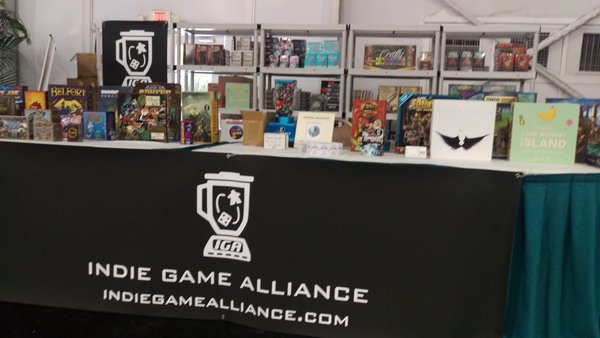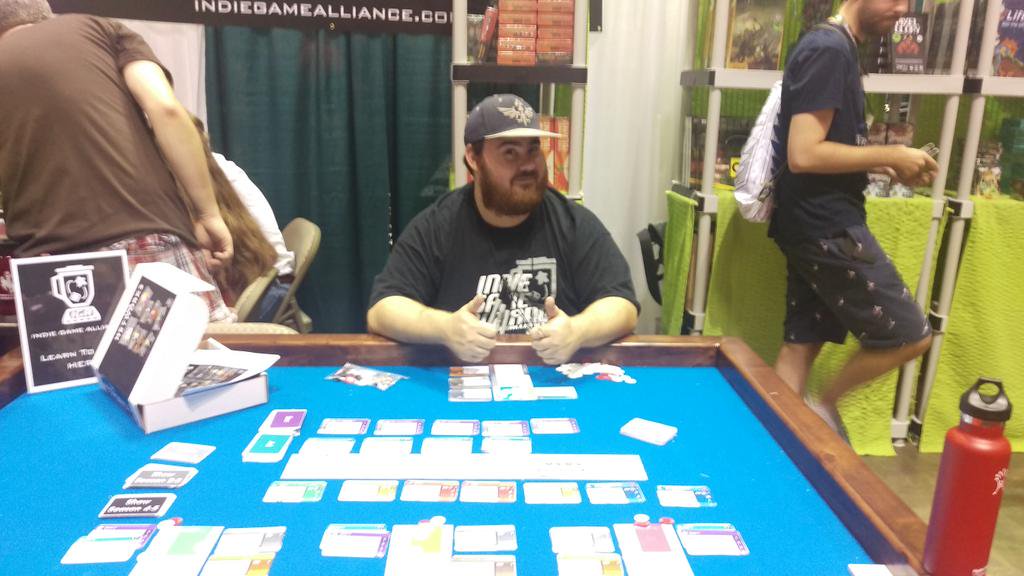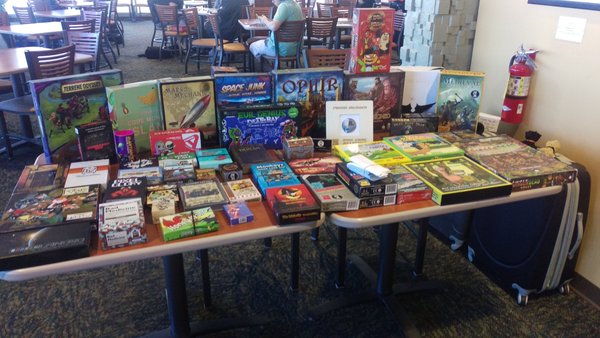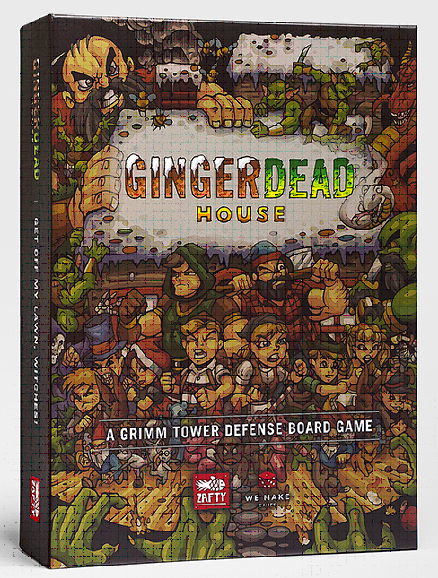Role Selection is an interview series in which we chat up folks who work, live, and play board games in a variety of ways to learn about the roles in the hobby they’ve chosen.
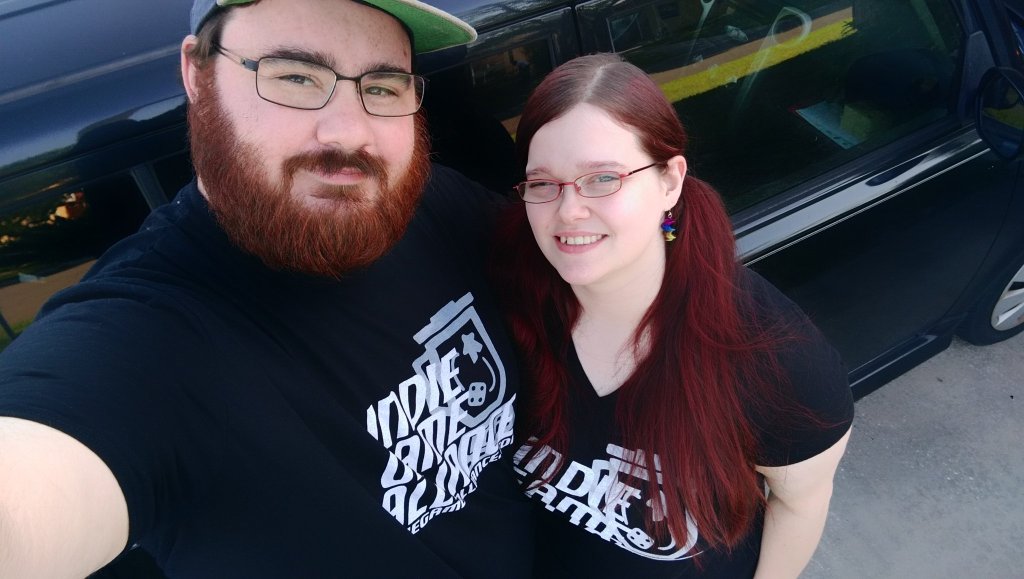 Character Name: Matt Holden
Character Name: Matt HoldenRole: Executive Director, Indie Game Alliance
Location: Orlando, Florida
Childhood Family Favs: Scrabble, Boggle
Current Favorites: Gingerdead House, Valeria: Card Kingdoms, and Coma Ward
Position on New Monopoly Tokens: A fine line between staying relevant and keeping classic.
Quote: “It’s hard to pick a favorite when we see 10 new games a week!”
Character Bio: Minions. They’re everywhere. Which is cool with Matt Holden, the founder and executive director of Indie Game Alliance, because we’re not talking about the yellow, bug-eyed animated type of minions. Instead, we’re talking about IGA Minions—volunteers who playtest, teach and report on games created by IGA members.IGA has been compared to a support system for indie designers and publishers. Minions playtest games, staff convention tables, and provide valuable feedback on games they’re testing.
There’s pre and post-production assistance as well: helping to make connections with artists, getting up and running on Kickstarter, even selling games at conventions. And members themselves help each other through IGA’s website and private Facebook group.
IGA is free to join at the Starter level, though a lot of the benefits come at the $20/month Pro level.
Matt came to board gaming in 2004 while earning a degree in video game design from Full Sail University. One of his teachers was Dave Arneson, who helped create Dungeons & Dragons. Naturally, Arneson used board games to help his class understand design balance in video games. Matt’s been playing board games ever since.
I asked Matt how he came to start IGA three years ago, and how the mission has changed since then.
The Interview:
Matt Holden: While I was in Dave Arneson’s class, my mother passed away and my dad needed me to stay close to home, so I couldn’t leave Florida when I graduated from Full Sail. There’s not too many video game jobs available here in Florida, and I eventually missed gaming enough to want to get involved any way I could. I applied to Steve Jackson Games’ demo program, and worked with them for a few months, but I found myself wanting more of a leadership role.
I approached Brotherwise Games about building a demo program for Boss Monster. I was actually a Brotherwise employee for maybe three days, and we hit a snag: when you only make one game, what do you offer as a reward for people who demo that same game? I suggested we could start a sort of coalition for three to five companies to share a demo team, and Brotherwise said they’d rather be a client of that service than its owner. Johnny O’Neal told me that day that if I could get five companies to join, it’d be a success. We’re (IGA) at nearly 600 as we approach our three year anniversary.
Since then, the mission has expanded far beyond demos. We’ve done our best to become a full-service guild that makes all aspects of game creation, rather than just the marketing, a little bit easier. That’s why we’ve got the discount program and the sales booths, and a few other rabbits in our hat for next year.
Matt Golec: Is this a full-time job for you? If not, what do you do to pay the bills?
MH: Much like most of our members, I dream of the day I can do this as my only job. I put in probably 40-50 hours a week doing IGA, and then also do Web development at an international data center company. Previous gigs have involved marketing, paralegal-type work, manufacturing, technical writing, and R&D.
MG: You’ve got two tiers of membership, Starter and Pro. Can you explain what stepping up to Pro gives you?
MH: Pro membership gets you access to warehousing and selling of your games, as well as distributing them to our volunteers. Starter members can get their games demoed by any Minions who already have them. Pro also unlocks over 40 discounts we’ve negotiated with manufacturers, fulfillment companies, pledge managers, BoardGameGeek, some conventions…basically everything we could think of that you need to put together a successful Kickstarter. Pro also gets you some consulting time with me, access to our playtesting team, and a few other goodies that are coming soon.
MG: Has the popularity of Kickstarter meant more designers coming to you for assistance?
MH: Absolutely. Without Kickstarter, I don’t think IGA would exist. It’s democratized game publishing to the point that someone doing it as a hobbyist can make it happen. Before Kickstarter, your game was either printed by someone like Hasbro or Mayfair, who have the resources to support a release, or it didn’t see the light of day. But now, you’ve got all these creators that are one-man (or one-woman) bands trying to support their games. They don’t get decent pricing on manufacturing because they’re making small batches, the learning curve for things like international shipping, printing and so forth is astronomically more than just game design theory, and they don’t have the audience or the boots on the ground to get the word out about their game. IGA’s mission statement is to try to level the playing field for those designers on all those fronts as much as we possibly can.
The Ever-Growing Alliance
MG: Are there any lessons you’ve learned over the past three years you wish you knew when you were starting out?
MH: So many. So-ooo many. Because what we’re doing is somewhat unique in the community, we’ve been a square peg in a round hole for so long. What started as an idea to just do demos has morphed into this thing where we’ve had to become experts on printing and shipping and logistics and…well, a lot of the same stuff our members have to go through when they run a Kickstarter. Over time, we’re helping to reduce the learning curve for our members by providing guidance where we can.
MG: How active is the IGA community? Do they interact and help each other, outside of the formal membership program?
MH: Every day. We have a dedicated IGA designer Facebook group that probably gets 8-12 posts a day, ranging from feedback about a potential vendor or freelancer, to a request for more eyes on a Kickstarter or a rulebook, to advice on solving a particular design issue that’s come up. Indeed, it’s the fact that game publishers don’t view each other as competitors that allows IGA to function at all.
MG: You hinted at some future plans in store for IGA. Is there anything you can share at this time?
MH: Right now, our big focuses are on continuing to grow our volunteer Minion corps and expand our convention presence, including internationally. We’re getting ready to launch an e-commerce platform that will let retailers order games wholesale from us, which will be part of a broader retail support program we’re working on. We’ve got something interesting in the works involving reviewers as well.
MG: Can you share a story about a designer or company that’s been helped by IGA?
MH: I think one of my favorites is Gingerdead House. The designers were local to me, and just fantastic people, and I fell in love with the game when I got it. It didn’t do so well on Kickstarter the first time around, and the designers largely shelved the project. I basically refused to let it die, and continued to demo and playtest.
A full year later, I ran into Frank Alberts from Zafty Games at Dice Tower Con, and he told me he was looking for a unique and innovative game to publish. I all but kidnapped Frank from the show, and we sat down at my dining room table and played a game on my prototype. By turn 2, Frank was texting pictures to his business partner and the contract was being negotiated that night. I ended up handing over my playtest notes, which went verbatim into the final card text.
It was a very validating feeling to hold a retail copy in my hand (I was backer #1) and know that if I hadn’t been so passionate about that game, so many others who now love it wouldn’t have gotten a chance to. Stories like that are what I want IGA to be all about—being that little extra nudge, that last 1%, that makes a game designer’s dream a reality and gives countless families and friends another way to laugh and play together.

Wedding bells are in the future for IGA this fall, as Matt Holden marries IGA’s assistant director Victoria Hardman, making this a true family operation.
For more information about IGA, check out their website, find them on Twitter, or dial up Facebook.
Matt Golec is game designer with a background in print journalism. Combining these skills, he aims to explore and give voice to the many different jobs within the hobby industry that don’t frequently get reported on. He can be best reached via Twitter.
You can discuss this article and more on our social media!
Photo Credits: Multiple Photos from BoardGameGeek and Indie Game Alliance.

